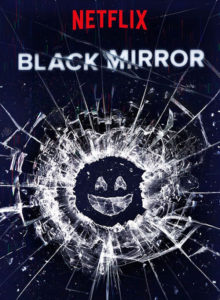TV Review: Black Mirror

Black Mirror is a British anthology series currently streaming on Netflix. Now in its fourth season, the show examines the unanticipated consequences of near future technologies. Inspired by The Twilight Zone, Black Mirror utilizes components of science fiction, psychological thrillers, and satire to highlight “the way we live now—and the way we might be living in ten minutes’ time if we’re clumsy,” according to the show’s creator, Charlie Brooker.
Past episodes have tackled issues and uses of technology such as punishment, to cope with loss, to revisit memories, and as an alternative to death. Black Mirror is especially notorious for its dark twists, as promising technological advances expose sinister aspects of human nature.
But Black Mirror’s fourth season, released days before the New Year on December 29, offers audiences a greater sense of justice and emotional satisfaction than previous seasons. Although much weaker than its predecessors, season four continues to depict a dystopian future where advances in technology test humanity’s commitment to morality.
Here’s a superficial recap of each episode, so as to not give much away:
In “USS Callister,” the chief technical officer of an online virtual reality (VR) game inspired by Star Trek replicates coworkers in his personal version of the game where he is the captain; in “Arkangel,” after nearly losing her daughter, a mother signs up for a new technology that allows her to monitor her child; in “Crocodile,” a woman with a questionable past meets an insurance agent investigating an accident with a special device; in “Hang the DJ,” a new dating app controls every aspect of personal relationships to help consumers find the one; in “Metalhead,” a woman attempts to survive in a world with robotic guard dogs; and in “Black Museum,” a woman enters a museum in the United States with Black Mirror technology on display.
The ability to “upload” all or parts of the human brain weaves within each narrative this season. While Black Mirror certainly has an overarching tone, this is the first time creators recycle one specific theme throughout an entire season. Five of the six episodes explore different technologies that invade, capture, or extend the human mind, and the personal and societal ramifications of doing so. For example, “Black Museum” scratches the surface of race and criminal justice within this theme, but it never quite completes the thought (a detailed analysis of this episode, with spoilers, by Hari Ziyad can be read here).
Black Mirror is at its best when it presents thought experiments that explore what makes us human, particularly when our unbridled embrace of technology collides with our flaws. But season four repeats old tricks and favors simplistic narratives and optimism over coherency. Brooker’s talent of suspending the audience’s disbelief is severely lacking, highlighting gaping holes in its technological exploration and vision—ultimately making season four feel inauthentic.
But that isn’t cause to give up on Black Mirror just yet. The finest episodes are unique, daring, and raise vital concerns. The first three seasons initiated a dialogue sorely needed, and one that isn’t completely lost in season four. There’s no doubt that technology has improved our lives, and if we stay on our current trajectory, we’ll likely continue to develop technologies that positively affect humanity. But are we at a crossroads? Will we progress, obtain unlimited knowledge, peace, justice, and prosperity? Or are we working our way toward an impending dystopia? According to Black Mirror, if we don’t ask these questions now, the answers may be bleak. As humanists, free of constraints from religious indoctrination and motivated by the greater good, it is our responsibility to address these questions and more. Technology will not save us so long as we ignore social, economic, environmental, and political injustice.
